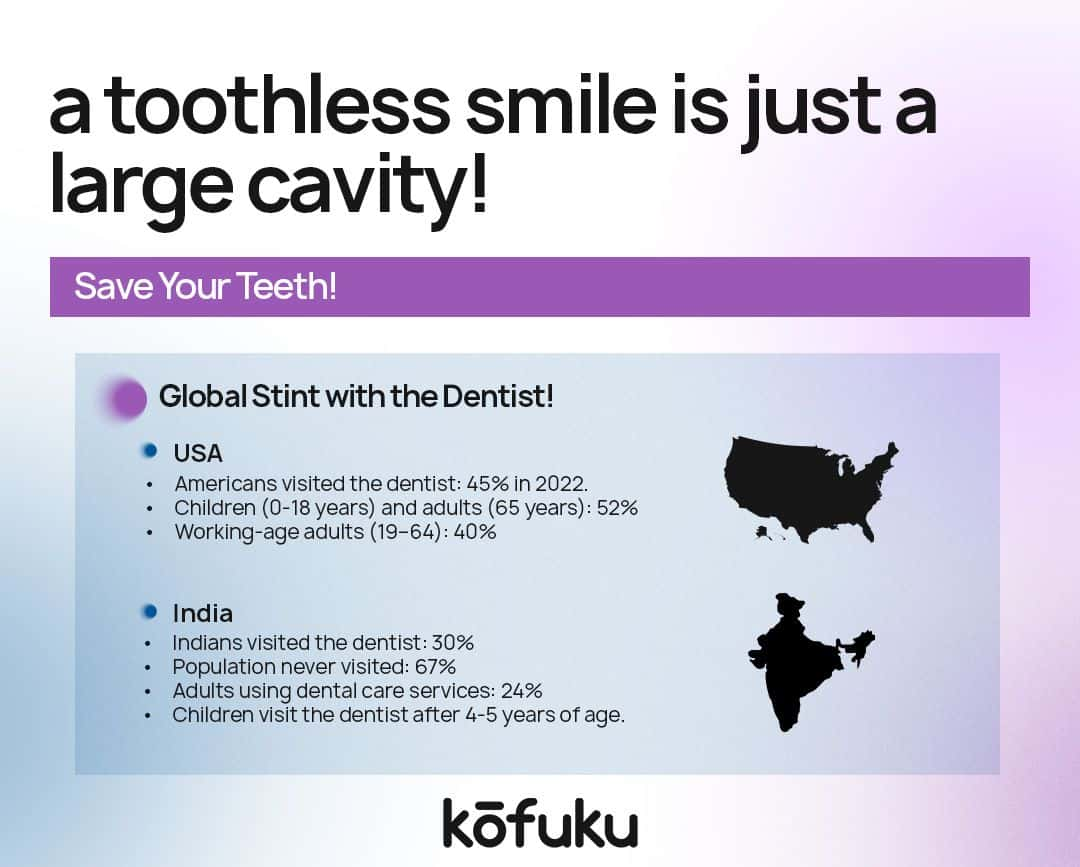Taking Care of Your Teeth Means Taking Care of Your Heart – A Deep Dive

Introduction
The way to someone's heart is through their stomach, so is it any wonder that your dental health is directly connected to your cardiovascular health?
That's right, your teeth and gums aren't just about looking (or smelling) good; they're intricately linked to your overall well-being, especially your heart's health. Kofuku is here to give you a crash course on how exactly dental care affects heart health.
The Link Between Teeth and Heart Health
For the both to be linked, they need to have a direct line of communication. One word: inflammation. ‘Tis the harbinger of many a disease, and here's how:
Dental Plaque:
The sticky film constantly forms on your teeth. It is also a breeding ground for bacteria. When plaque builds up, it can irritate your gums, leading to inflammation and gum disease.
Gum Health:
Healthy gums are pink and firm. Red, swollen, or bleeding gums are a sign of gum disease, which, as discussed, can have profound implications for your heart.
Oral Bacteria:
The bacteria in your mouth, especially those associated with gum disease, can enter your bloodstream and contribute to inflammation. This inflammation can damage blood vessels, increasing the risk of heart disease.
Inflammation:
Chronic inflammation is a major driver of cardiovascular disease. The inflammation caused by gum disease can contribute to the buildup of plaque in your arteries, leading to heart attack and stroke.
The review article from ScienceDirect better highlights the role of oral bacteria in the development and progression of heart disease. It's basically like a domino effect: gum disease leads to inflammation and heart disease.

Periodontitis and Cardiovascular Health
With all the importance of gum in this scene, it has an equally important sounding name: Periodontitis. A severe gum infection damages the soft tissue and bone supporting your teeth.
Acting much like a sneaky invader, its impact can extend far beyond your teeth. We are particularly interested in periodontitis not because it tends to induce sore gums and bad breath but because of its role in the development of cardiovascular disease.
Simply put, your mouth is a gateway to your body. When you have gum disease, bacteria can enter your bloodstream and travel to other parts of your body, including your heart. This can trigger inflammation, which is a key factor in heart disease.
A 2023 systematic review of the subject found a strong association between periodontitis and an increased risk of heart attack, stroke, and other cardiovascular issues. We're talking about a growing body of evidence suggesting a causal link, not just a passing correlation.
The Importance of Dental Care for Heart Health
Well, things are getting serious now. Your dental health does, in fact, affect your heart health. So how do we keep both healthy and hale?
Not to be elementary, but brushing your teeth twice daily for at least two minutes with fluoride toothpaste is essential for removing plaque and preventing gum disease. Don't forget to brush your tongue, too – it's basically a bacteria party house otherwise!
Flossing (not the dance) daily is crucial for removing plaque and food particles from between your teeth, where your toothbrush can't reach. It covers all bases and keeps you from embarrassing yourself at live telecast New Year's Eve parties.
Using an antiseptic mouthwash can help kill bacteria and reduce inflammation in your mouth. Contrary to its name, it's not a replacement for brushing teeth. It's more like an extra reinforcement against gum diseases.
A diet rich in fruits, vegetables, and whole grains is suitable for your oral and cardiovascular health. Limit your intake of sugary foods and drinks, which can contribute to plaque buildup and gum disease. That's the one thing that all the toothpaste ads have gotten right.
The Role of Dentists in Cardiovascular Health
Since dental health plays such a significant role in your heart's health, dentists must naturally also be part of it.
They're not only there to tilt your head and lightly torture you for an hour or two (depending on their mood). They can also help you understand the link between your oral and heart health.
For example, your dentist can screen for gum disease, provide treatment, and refer you to a physician if they suspect you may have heart disease. They are infinitely better equipped to test and diagnose your issue so you can get timely help.
So that begs the question: How often should you see your dentist?
Most dentists recommend (Colgate and…) setting an appointment every six months for a checkup and cleaning. However, if you have gum disease or other risk factors for heart disease, you may need to see your dentist more frequently. Not even an apple is going to help you there, my friend.
Second, I think it might work if you start early and keep at it consistently. Not lobbing apples at your doctor's, but eating them!

Conclusion
Taking care of your teeth and gums is an investment in your overall health, not just your heart health. Your consistent effort will reflect on your body because a healthy mouth is directly connected to a healthy body. So, keep brushing, keep flossing, and keep smiling – your heart will thank you for it!
FAQs
Can I reverse gum disease?
The good news is, yes. In many cases, gum disease can be treated and its progression has been halted. Early stages of gum disease, like gingivitis, can often be reversed with proper oral hygiene and professional cleaning. More advanced periodontitis may require more intensive treatment, but it can still be managed.
What are the early signs of gum disease?
Keep an eye out for red, swollen, or bleeding gums. If they are accompanied with bad breath that just won't quit, receding gums with loose teeth or in extreme cases, pus between your teeth and gums, then you really need to see your dentist ASAP. Early detection has saved millions of lives!
Does flossing really matter that much?
Absolutely! Flossing helps you reach those areas your toothbrush can't, removing plaque and food particles that can lead to gum disease. Imagine trying to clean a tiny crevice with a big broom – you need something smaller and more precise, and that's what floss is for!
Are there any specific foods that are good for my gums and heart?
A diet consisting of colourful fruits and veggies, leafy greens, and whole grain breads and cereals. These foods are full of nutrients and antioxidants that help fight inflammation and keep you healthy. And, don't forget to stay hydrated!
What can I do if I'm nervous about going to the dentist?
Dental anxiety is totally understandable. Talk to your dentist about your concerns. They can explain every procedure before doing them, offer relaxation techniques, and even provide options like nitrous oxide (laughing gas) to help you feel more comfortable. Having you at ease and getting the care you need is all your doctor wants out of your visit. So don't be afraid to ask for help when you need it!




